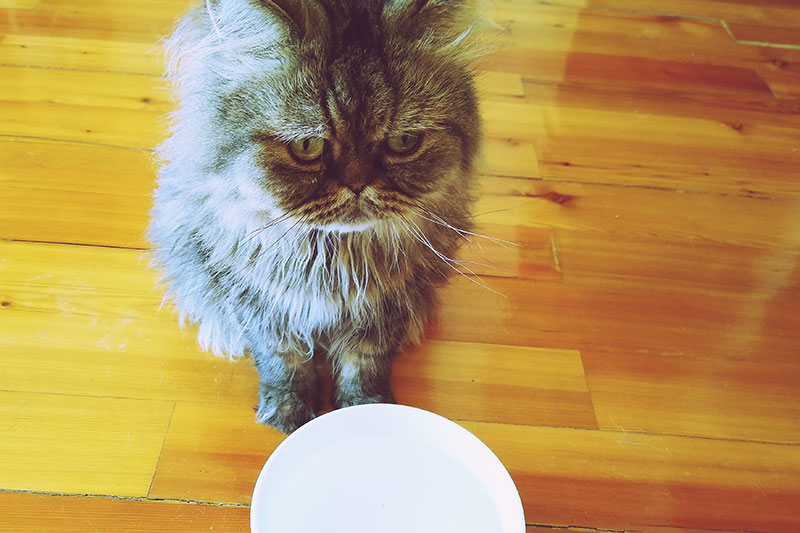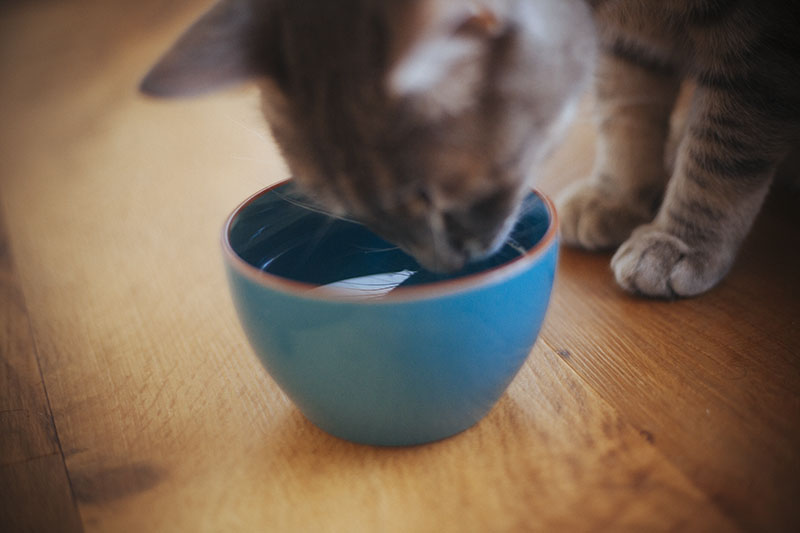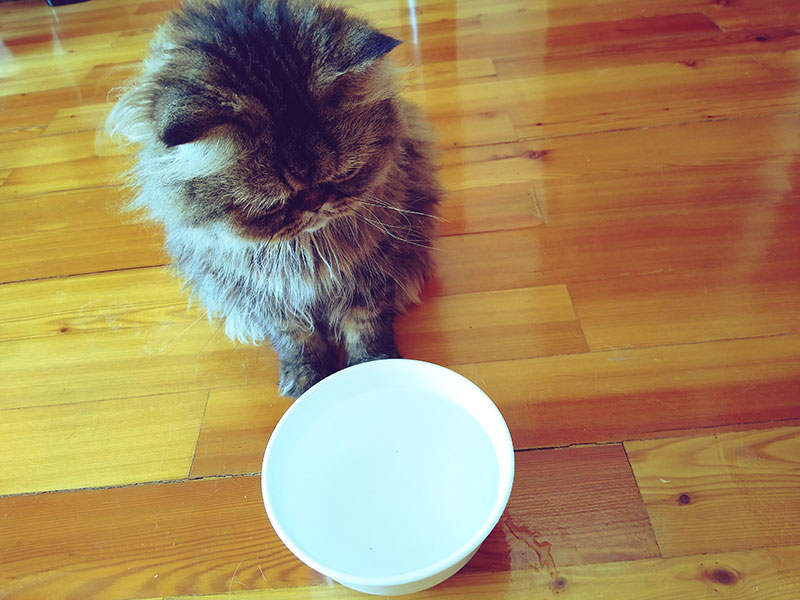There are quite a lot of people who grew up offering milk to local stray and feral cats they wanted to take care of, or even to their own cats at home.
This could be because we wanted to help keep cats well fed, and since we know milk has important nutrients contained within it – calcium, protein, iodine, potassium, phosphorus, as well as vitamins B2 and B12 – we thought of milk as nutritionally valuable and healthy for cats to have.
It could also be because, due to how much cats seem to adore lapping milk up, we thought the white liquid could keep them better hydrated, something many cats sometimes struggle with. Since they will typically happily drink quite a lot of milk in one sitting in comparison to just plain water, this makes sense.
These days, it’s better known that lactose intolerance amongst our feline friends is incredibly common, so it’s more likely to see pet parents hesitate before giving their cats or feral/stray kitties they care for outdoors milk. Yet this doesn’t negate the fact that we simultaneously still realize just how much cats love drinking milk.
Why would cats like milk – and actually seem to adore lapping it up in comparison to so many other things they barely touch to drink or eat – when milk is actually not good for cats?
I’m hoping to shed some light on this very question in the remainder of this article.

First, Why Milk Is Actually Bad for Cats: Lactose Intolerance
Plainly put, milk is bad for cats because lactose intolerance amongst them is incredibly common.
In the article “Cats and Dairy: Get the Facts” Wendy C. Fries points out why this is likely to be the case, although cats can easily consume milk without any negative symptoms when they’re kittens –
“The only time animals are exposed to lactose is when they’re babies — in their mother’s milk,” Case says.
To digest lactose, a milk sugar, the human and feline digestive systems must contain the enzyme lactase. We have plenty of this enzyme in our systems at birth, and it helps us thrive on our mother’s milk.
But as we grow up, it’s normal for people and cats to begin producing less lactase. Less lactase means less ability to digest lactose. The result may eventually be lactose intolerance.
Thus, as we grow up, less of the enzyme lactase means less tolerance to lactose in both human and feline lives over time. Hence why human and cat babies can consume milk so easily with no symptoms, while adult cats and humans often struggle with the symptoms.
I suggested in the intro that the fact that cats are mostly all lactose intolerant (to varying degrees) is beginning, more and more, to be common knowledge, although I do feel what this lactose intolerance itself entails in terms of symptoms felt is a touch less understood.
If you don’t have lactose intolerance and don’t know anybody else who has it, you might be curious about what eating dairy when you have lactose intolerance really entails, so let’s go over that now.

Symptoms of Lactose Intolerance: What Cats Drinking Milk Normally Entails
It’s important to note that, unlike milk or dairy allergies, lactose intolerance is not an allergy and is not life threatening. As FARE points out:
Unlike food allergies, food intolerances do not involve the immune system. People who are lactose intolerant are missing the enzyme lactase. Lactase breaks down lactose, a sugar found in milk and dairy products. As a result, people with lactose intolerance are unable to digest these foods. They may experience symptoms such as nausea, cramps, gas, bloating and diarrhea. While lactose intolerance can cause great discomfort, it is not life-threatening.
So we’re looking at symptoms related to discomfort if you’re lactose intolerant and consume dairy. As the source lists, this includes experiencing:
- Nausea
- Cramps
- Gas
- Bloating
- Diarrhea
None of these are life threatening, and lactose intolerance on it’s own isn’t life threatening, though, as has already been pointed out, it can feel very uncomfortable.
Just like humans, cats have varying levels of tolerance to lactose – some cats can have more of it without having any symptomatic ramifications, others can have very little before they have to deal with pretty uncomfortable symptoms of lactose intolerance.
How prone a cat is to developing the symptoms after consuming dairy is really dependent on the cat in question, which is something I talk about in my article on whether cats can eat cheese.
So can you feed your cat a little cheese? Offer your cat a little milk as a snack without him or her having any discomfort? Probably, yes. Though you’ll likely want to play it safe if you don’t know how much dairy your cat can consume.
Symptoms on the worse end of the lactose intolerance spectrum include diarrhea, farting and bad gas, upset stomach, and sometimes even vomiting (if their tummies get upset enough). So you really don’t want to push it, especially if you don’t know if the cat you have is fine with dairy.
If you’re trying to get your cat to drink more water by offering up milk as a snack, you can try these surefire techniques too help you get your cat to drink instead. None of them include offering your cat dairy products, which could lead to stomach problems, but they do include offering your cat liquids that most cats find irresistible, like catnip cold tea, which is a bit of catnip sprinkled into water that to most cats is highly delicious.
If you still feel you want to use milk, but are worried about the symptoms, give only a little milk, and try increasing the amount you offer a cat very gradually and watching out for any symptoms that may arise as you do.
You can also cut the milk with water, drastically decreasing the amount of problematic dairy, but still giving your cat a tasty drink nonetheless. If you don’t water the milk down too much (I used to get away with 25% milk, 75% water, but I know some pet parents can’t get their cats to drink milk this watered down), you can usually get away with a considerable amount less dairy while still having your cat lap up all the liquid.

When Having Dairy Can Be Life-Threatening for Cats
This is true for humans who have lactose intolerance and consume dairy, and it’s true for cats as well: it’s not life threatening to consume lactose when you’re lactose intolerant – usually.
There is one qualifier here – which is if your cat is having other health problems, especially once he or she is taking medication for, consuming dairy can be incredibly problematic, and yes, may even be life threatening.
Dr. Tawnia Shaw, DVM, the vet behind The Happy Pet Vet, pointed out in an interview with PetMD that “some medicines do not do well if taken with high calcium foods. Doxycycline, an antibiotic, for example, gets bound to the calcium and then does not get absorbed.”
So, if you ever offer your cat milk to lap up or cheese to eat as a snack, and your cat ends up on any kind of medication, make sure you double and triple check with your vet that your cat can actually consume dairy with this medication. Or, to be on the safe, skip out on the milk and cheese snacks altogether if your cat is ever on medication. Just to be safe.
If you give any other human snacks to your cat, do take the time to check each one to see if the medication your cat is going to be on will have any other food related conflicts as well.
If you were considering using milk to sprinkle the insides of your cat’s pill into so he or she laps it up without realizing, as the milk would mask the taste, or of you thought to use cheese to hide medicine pills you need to convince your cat to eat, pass on this. Instead, try specially made cat treats that come with holes in them for you to insert your cat’s medicine tablets or capsules in, like Greenies Pill Pockets.

Second, Why Cats Really Like Taste of Milk
Why cats like to drink milk is a completely different story. Try ignoring what we spoke about completely in terms of their lactose intolerance for a second, because when it comes down to loving milk, really it comes down to taste, and nothing else.
There are certain things in the world you likely adore the taste of that you know others in your family and friend groups disdain. There are others that are pretty much universal, where you’d be hard pressed to find someone who dislikes the taste of that particular thing – like chocolate. Most humans like chocolate.
I feel like when it comes to the taste of milk, the same is true for cats. They just like it. The vast majority of them.
Milk isn’t like eggs or peanut butter, which some cats adore, but the majority of cats I’d suspect will be indifferent to. It’s not like lettuce where most cats will likely take a bite or two then no longer want anymore. And to be honest, it’s probably the polar opposite of bananas, which most cats abhor and will never try, although some will love consuming.
Milk is a taste that jibes well with a plethora of cats. It just is. And I’ve seen a lot of people try to make the argument that it’s because milk has a lot of fat, and cats are attracted to the taste of fat.
Yes, cats like the taste of fat, but these days, who’s buying high fat milk anymore? 1 or 2% milk and skim milks just aren’t fatty enough to make that claim, in my opinion. But cats are still typically still crazy for the stuff.
So what’s up with that? In my opinion, it’s just a matter of taste. Cats must just like it. Whether or not there’s a lot of fat – milk seems to smell and taste really good to cats.

Finally, Why Cats Would Like Milk Even Though It’s Bad for Them
Okay so we’ve now gone over quite thoroughly why milk isn’t good for cats, and briefly why I think cats just plain like the taste of milk, nearly universally, as humans seem to for some reason just love the taste of chocolate.
Now, let’s go over why cats would like drinking milk, even though it’s possible it’ll give them some real discomfort if they consume it and don’t have a high tolerance to lactose themselves.
Before I state what I believe the answer is, I’d like you to take a moment and guess for yourself why you think this may be.
Why might cats like milk even though it’s bad for them?
Well, the answer, it seems to me, is they’re not very different from humans.
We eat and drink things that aren’t good for us all the time – and the reason why – usually, because they taste good.
There are tonnes of times when we’ll eat take out food, drink soft drinks, eat plenty of dessert, when we know it’s not good for us.
Heck, I know my share of lactose intolerant friends and family members (it runs in my family), and to be honest, a lot of them like cheese and ice cream so much, they’ll consume the amazing stuff and accept the ramifications of those terrible side effects later.
Sure, there are tablets you can take just before consuming lactose that make it so you don’t have to deal with the symptoms, but if they’re out and don’t have access to those, or if they just forgot to grab some more after they ran out, I’ve known a lot of people to just risk it and have a little, even though they know the discomfort is likely coming.
Now imagine cats – who probably don’t have any conception of “I’m feeling poorly because I ate cheese/drink milk.” If they can’t even make a connection between the negative symptoms and the dairy consumption, why would they ever turn down a bowl of milk or a nibble of cheese? There’d just be no sense in it.
Cats like the taste, cats likely can’t even realize or make the connection that there’s a negative physical side effect to drinking milk/eating cheese/consuming dairy, why wouldn’t they ingest it?
They’d pretty much be crazy if they didn’t!

Your Thoughts on Cats Liking Milk?
But now I’d like to know what you think – and if you feel like my explanation makes sense, as well as if you have another one.
Why do you think cats like the taste of milk? What about it do you think is tasty to them?
Also – how lactose intolerant do you believe most cats are? Have you ever given dairy to a cat or multiple cats? Did they have any negative symptoms (like farting or diarrhea) from what you could tell?
Do you regularly feed dairy to your pet and if so, what quantity do you feel is safe?
Would love to hear your thoughts as well as any stories you have related to cats and milk or cats and dairy in general in the comments down below!

I think I pushed wrong button to post a question so I’ll ask again. What are your thoughts on lactose free milk. Seems to work for humans but what about cats??? Thanks for your informative article, Linda
I agree that lactose intolerance may be one of the reasons milk is bad for almost all cats. But that is not all. Milk has preservatives and other substances that are toxic and cows receive hormones and other shots like antibiotics while they take their milk. Milk is a toxic product nowadays and not only cats but humans are very intolerant to milk. It is a mistake thinking that lactose is the only problem or maybe the dairy farms want you to think that, so they can sell especial milk without lactose. It doesn´t work. I and millions of persons don´t tolerate milk even if it doesn´t have lactose. Many dairy have already had to close because milk isn´t selling well lately. Until the industry doesn´t treat cows well, they will do worse and worse business.
Elise, just wondering your thoughts on lactose free milk which I know several people that tolerate it but would it work for cats? Thanks for this informative article, Linda
Yes, they work for cats. Cats have a lot of digestive problems. They are very different from dogs. Their digestive system doesn’t tolerate not only milk but many other foods that are partly toxic. As I said, milk today is full of toxic elements and cats have problems digesting it. Sometimes, the cat is very healthy and doesn’t show symptoms immediately, but in time, they get sick. I wouldn´t give milk to any cat. Collaborating with one shelter, I learned that if I give milk to a just born kitty whom we need to feed because he or she hasn’t a mother, we never give cow milk to him. We buy special cat milk formula or it would die. The problem is that cats are also allergic to any beans so they can’t drink soy or almond milk either. Place several bowls with lots of water to encourage them to drink. They don’t drink enough water if you don’t find the way to encourage them.
Never thought about it to be honest! I’m guessing it’s okay if it’s only a little, though personally I’d dilute it with half water just to be on the safe side!